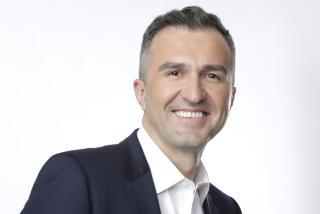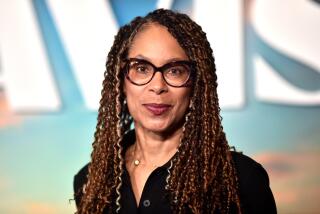New PBS head ‘a great unifier’
- Share via
NEW YORK — After a year of fractious struggles in public broadcasting over politics and finances, the Public Broadcasting Service turned inward this week for its next leader, selecting a veteran public television station executive known for her diplomatic skills to guide PBS.
The PBS board of directors announced Monday that it has selected Paula Kerger, a top executive at New York’s Thirteen/WNET, to be the system’s next president and CEO. Kerger will replace outgoing president Pat Mitchell, a former commercial television executive who is taking over the helm of the Museum of Television & Radio, a nonprofit organization that preserves broadcasting programs.
Kerger’s appointment was greeted with optimism by many of the system’s advocates, who called her the right person to tackle its current challenges.
John Lawson, president of the Assn. of Public Television Stations, expressed hope that Kerger will be able to resolve some of the historic tensions between PBS and the 348 member stations that finance it, noting her “calm demeanor” and depth of experience.
“You’ve got to find a way to preserve the localization in public television, but also pursue business strategies that are necessary for survival in a content-driven world,” Lawson said. “I think Paula’s hiring creates perhaps a unique chance to reconcile those two competing approaches.”
Kerger comes to the post after 13 years at WNET, one of public television’s biggest producing stations. She was first hired to run the station’s fundraising campaign, ultimately raising $79 million, the largest endowment program by a public television station. She went on to be WNET’s station manager and then chief operating officer of the Educational Broadcasting Corp., the parent company of WNET and WLIW New York.
The PBS board unanimously voted for her selection during a special meeting in Dallas on Sunday. The decision followed an eight-month search process in which nearly 120 candidates were considered, said Mary Bitterman, the board’s chairwoman.
As the sixth president of PBS, the 48-year-old broadcaster will be the third to come from a local station. Her three-year contract begins on March 13.
“She’s someone who we felt would be a great unifier of the system,” Bitterman said. “Because she knows the system well -- knows both newcomers and seasoned participants and brings a respect for the accomplishments of all -- she will have a very unifying influence, which will be very constructive.”
Kerger is taking over PBS after a tumultuous period. Last year, congressional Republicans threatened to yank much of public broadcasting’s federal funding, an attempt that was eventually defeated.
Meanwhile, the system was racked by a turbulent debate about political bias instigated largely by Kenneth Y. Tomlinson, then chairman of the Corporation for Public Broadcasting, which distributes federal money to public broadcasters. After seeking to promote conservatives to counter what he saw as a liberal slant in the system, Tomlinson was forced to resign in November when an internal investigation concluded that his efforts broke federal law.
In addition, PBS has had to cope with an aging audience and competition from cable networks that increasingly provide the kinds of the documentaries and children’s programming that have long been the mainstay of public television.
The new president said she hopes to proactively make a case for PBS’ value in order to head off future political squabbles and budget showdowns.
“I think unfortunately in public broadcasting we sometimes wait until there is criticism,” Kerger said in an interview Monday. “There is a scope of work that no one does like public broadcasting. We really need to think about that -- we need to not only tell the story better, but we need to make sure that we’re putting resources into really doing the kind of work that no one else is doing.”
Kerger said she is prepared to cope with the kinds of political pressures often placed on the taxpayer-supported service.
“Because we do reflect a diversity of viewpoints and because we don’t always go down the safe path, that tension is always going to be there,” she said. “But if we are able to focus on what I think are the two hallmarks of public broadcasting -- which are authenticity and quality -- then I think at the end of the day we’ll prevail.”
The new PBS chief said she plans to use her post to cultivate talent at local stations as well as build the resources of the PBS Foundation, which was established in 2004 to provide a stable source of financing for the system. So far, it has raised about $13 million, and Kerger said she wants to increase that to $100 million within the next five years.
She comes to the job with an extensive background in fundraising. Before joining WNET, Kerger worked as the director of principal gifts for the Metropolitan Opera. She also raised money for the U.S. Committee for UNICEF during a stint as a program development officer.
More to Read
The biggest entertainment stories
Get our big stories about Hollywood, film, television, music, arts, culture and more right in your inbox as soon as they publish.
You may occasionally receive promotional content from the Los Angeles Times.










